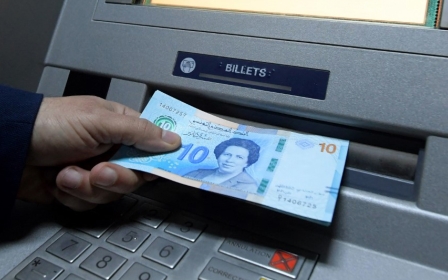Libya's rival central bank branches reunite

Libya's central bank announced on Sunday that its two rival branches in the west and east are reuniting after nearly a decade apart.
The North African country is currently split between Abdelhamid Dbeibah's UN-backed government in the west and another in the east backed by military strongman Khalifa Haftar.
Libya has seen 12 years of stop-start conflict since the 2011 Nato-backed revolt that toppled former leader Muammar Gaddafi.
On Sunday, the Central Bank of Libya (CBL) said it has "again become a unified sovereign institution", in a statement issued by the governor and his deputy.
The bank had been split since 2014, between the internationally recognised headquarters in Tripoli and another in Bayda in the Haftar-controlled east.
Stay informed with MEE's newsletters
Sign up to get the latest alerts, insights and analysis, starting with Turkey Unpacked
Al-Seddik al-Kebir, governor of the Tripoli-based bank, and Marii Moftah Rahil, governor of the rival branch in the east, made the announcement after a meeting attended by consultants and directors of both branches.
The statement said they would "continue efforts to overcome the consequences of the division".
The United Nations Support Mission in Libya said in a statement it "hopes the CBL's reunification will create momentum towards unifying all the country's political, security and military institutions as the people of Libya have long yearned for".
The US embassy in Libya also welcomed the move which it called a "show of unity" that "sets an important example for reconciliation across all state institutions".
"We encourage CBL leadership to follow... with concrete measures toward full integration of financial and oversight systems, including by activating the CBL board," the embassy said on X, formerly Twitter.
Tumbling currency
A process to reunify the central bank began in December 2021 after the split caused by power struggles between rival camps, as was also the case with other state institutions.
Rahil became deputy governor as part of the reunification process, and was in Tripoli on Sunday on his first visit to the capital since being appointed head of the Bayda branch by the eastern government's parliament in November 2022.
The Tripoli-based CBL oversees the substantial oil revenues of Libya, which boasts the most abundant oil reserves in Africa.
The financial institution is responsible for determining the distribution of funds among state and government entities.
The United Nations said in July 2022 it had finalised the process for launching an independent international audit of the two branches, seen as a major step towards reunification.
"This is an important step towards improving the performance of this sovereign institution," Dbeibah posted on Facebook on Sunday, reaffirming his government's commitment to "strengthening transparency and information procedures".
The existence of two competing branches has hampered the implementation of a single monetary policy, and the Libyan dinar has fallen sharply since the 2011 uprising.
Middle East Eye delivers independent and unrivalled coverage and analysis of the Middle East, North Africa and beyond. To learn more about republishing this content and the associated fees, please fill out this form. More about MEE can be found here.




.jpg.webp?itok=KLDEdA5-)
